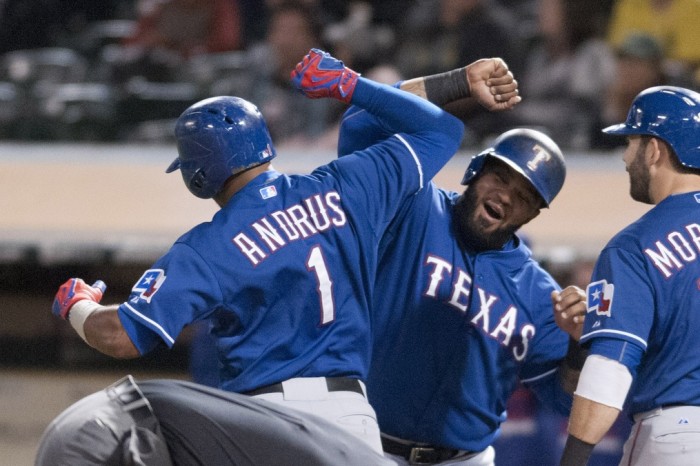I still love watching Prince Fielder play baseball. His energy — both the violent kinetic energy of his swing and the bright, joyful energy he brings to the dugout — is almost unmatched in Major League Baseball. Fielder is powering the Rangers’ run to the postseason, especially recently. Fielder has turned it on in the past two weeks, with four home runs, 16 RBI and a .277/.360/.518 slash line in 14 games. In that span, the Rangers are 10-4 and have gone from a half game behind the Astros to 2.5 games ahead in the division.
It all started with this massive two-run home run to take a late lead over division rival Houston on September 14th.
Fielder isn’t hitting for the kind of power he used to. Anything under 30 home runs in the hitter’s paradise that is Texas would have been a disappointment for the Fielder who went to three All-Star games as a Milwaukee Brewer and twice hit 40 in a season. Instead, Fielder, who always insisted he had the ability to be a consistent .300 hitter in Milwaukee, has put his money where his mouth is. The 31-year-old has become one of the league’s best contact hitters. He’s hitting .304 and has a meager 12.7 percent strikeout rate, which is 28th-best in the league. Of the 27 men in front of him, only Albert Pujols has more home runs than Fielder’s 22.
It’s great to watch Fielder at the plate, but his biggest highlights of late are coming in the dugout. He’s busting out secret handshakes after second-deck home runs. He’s joking about StatCast clocking his top speed at 18.2 MPH with Adrian Beltre (“I can’t run in some school zones. Did you know that? Some school zones won’t let me run.”) And he’s been dancing in the dugout since May.
Fielder is exuding the same kind of energy he did in Milwaukee, especially in 2011, the year of the Beast Mode Brewers. Beast Mode was great because it kept things light and fun — Fielder even called the name “too hard” — and a way to connect the team. Ryan Braun called it “something we do for each other, to get each other fired up when something positive happens.” That joyous atmosphere was a critical part of both the 2011 division champions and the 2008 team that broke Milwaukee’s 26-year playoff-less streak.
Fielder acknowledged the importance of that kind of loose, fun atmosphere in a spot for Rangers.com earlier this month. “For a couple years, here or there, I used to play against these guys and I’d be mad at them because they have so much fun. I’d be jealous,” Fielder said. “I like the way everybody keeps it close, it’s like a family.”
Because of Fielder and his impact on the Brewers — his ability to hold the team together and rally it — I firmly believe that what the baseball world calls “team chemistry” (the kind of loose environment where players can feel like a family) is critical to winning baseball. I acknowledge that this team chemistry is as much created by winning baseball games as vice-versa, if not more so. It’s not something that can be easily controlled or predicted. It’s not something analytics is prepared to handle — and when it tries, the results can be disastrous. But you also can’t watch this year’s Nationals, whose disastrous season was just capped off by Jonathan Papelbon choking Bryce Harper in the dugout, and say it doesn’t exist or matter.
So perhaps team chemistry should be thought of less as something to be controlled as something that should be allowed to develop. When it does, great things happen. In 2011 we saw so many players — not just Fielder, but Nyjer Morgan, Rickie Weeks, Ryan Braun, Corey Hart and John Axford — have some of the best years of their careers as they rallied around the team’s energy. That energy took some time to build, but once it did, centered around Fielder, those Brewers felt unstoppable. It hasn’t felt like this team has had a rock like him since he left.
When the Brewers are competitive again, it will be because they found another player — or players — who can be that cornerstone. Maybe it’ll be somebody already around, like Fielder had been for years, who finds that presence in the midst of a winning season. Maybe it’s somebody who isn’t around yet, somebody who can make an impact like Josh Donaldson has in Toronto this season, or a homegrown top prospect-turned-superstar leader like Buster Posey has been for the Giants all decade. But for now, I’ll have to settle for watching Prince be that rock in Texas, even if he is in the wrong uniform.

Great stuff, Prince has been an anchor in the middle of the lineup and a fun guy to watch, and to watch interact with the rest of the guys. My one critique is that Texas isn’t the hitters paradise it once was. Construction opened up the space behind home plate and now when the wind blows in, it no longer bounces off the Cuervo Club that had been there to cause a jet stream to right center, and the Ballpark in Arlington is more of a neutral park.